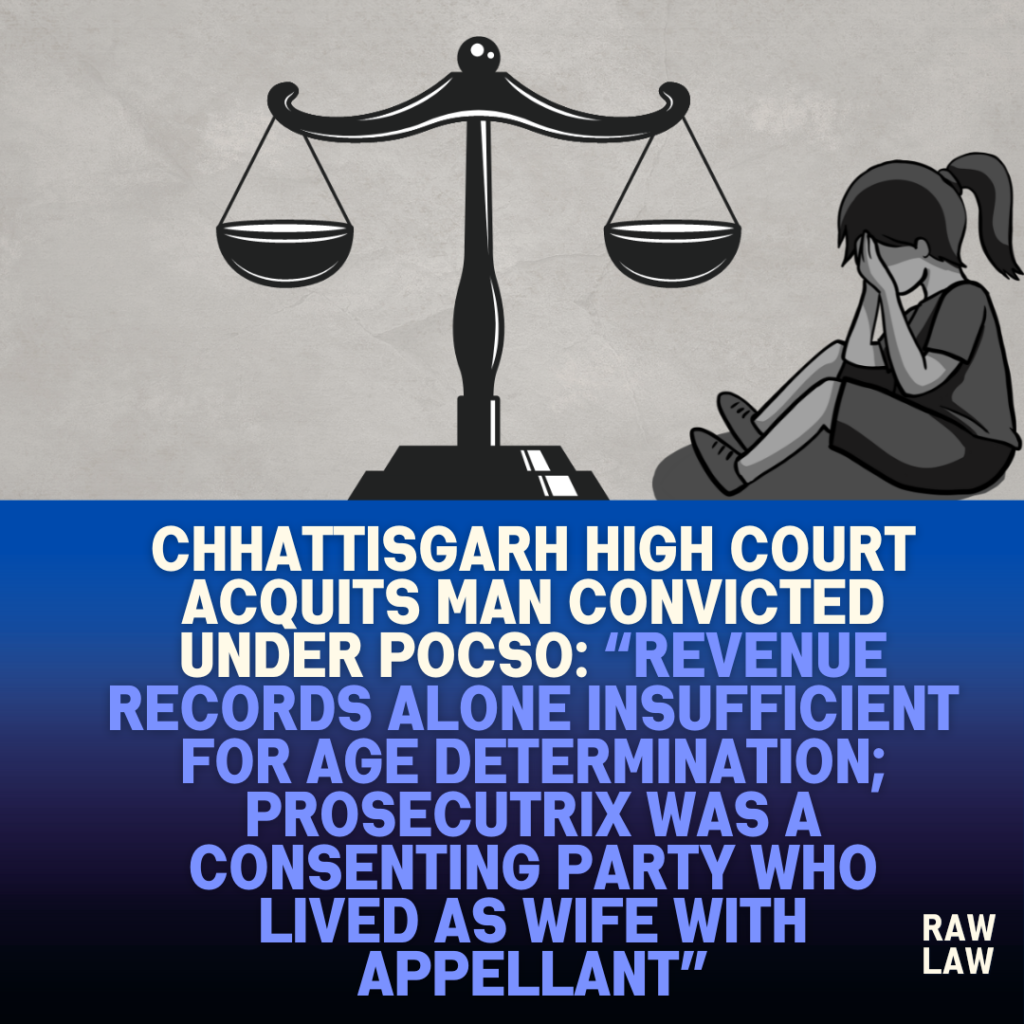Court’s Decision
The Chhattisgarh High Court set aside the conviction and life sentence awarded to the appellant under Section 6 of the POCSO Act and Sections 363 and 366 of IPC, holding that the prosecution failed to establish beyond reasonable doubt that the prosecutrix was a minor at the time of the incident and that the physical relationship was non-consensual. The Court held:
“Only on the basis of mutation register it would not be safe to hold that the prosecutrix was minor on the date of incident.”
“It is clear that the prosecutrix was a consenting party… she had voluntarily gone along with the appellant, travelled to various places and also resided as husband and wife.”
Accordingly, the Court allowed the appeal and acquitted the appellant of all charges.
Facts
The prosecutrix, then a 12th-grade student, was in a relationship with the appellant. On 21.01.2017, she and her friend accompanied the appellant to a Madarsa. Thereafter, the appellant took both girls to his house and later took only the prosecutrix to Raipur, where they stayed together in a rented house until 24.01.2017. He promised marriage and even applied sindoor to her at a temple but did not marry her.
Upon her family learning about her whereabouts, they recovered her from the appellant’s house on 24.01.2017. Her mother lodged a missing person report on 21.01.2017, which led to the registration of an FIR under Section 363 IPC. Upon recovery and based on her statement, Sections 366A, 376 IPC and Sections 5(d) and 6 of the POCSO Act were added.
Issues
- Whether the prosecutrix was a minor on the date of the incident?
- Whether the relationship between the appellant and prosecutrix was consensual?
- Whether the offence under Sections 363, 366 IPC and Section 6 of the POCSO Act was made out?
Petitioner’s Arguments
The appellant submitted that the prosecutrix was in a consensual relationship with him and they intended to marry. He relied on her admission that she accompanied him voluntarily and shared physical intimacy without coercion. He further contended that her date of birth was 18.09.1999, making her over 17 years at the time of the incident and mature enough to take her own decisions. It was argued that the prosecution’s evidence on age was contradictory and unconvincing. He claimed false implication due to inter-caste objections by her family.
Respondent’s Arguments
The State argued that the prosecutrix was a minor, as evidenced by school records (Ex.P-07) and the mutation register (Ex.P-23C). It was contended that even if the relationship was consensual, it was immaterial under the POCSO Act. The prosecution maintained that her statements under Section 164 CrPC and in court clearly established the appellant’s culpability.
Analysis of the Law
The Court analysed Section 35 of the Indian Evidence Act regarding admissibility and evidentiary value of public documents, especially school records and mutation registers. It held that while such documents may be admissible, their evidentiary value must be weighed in the absence of supporting material justifying the date of birth entries.
The Court highlighted the consistent position taken by the Supreme Court in:
- Ravinder Singh Gorkhi v. State of U.P. (2006) 5 SCC 584
- Alamelu v. State (2011) 2 SCC 385
- Rishipal Singh Solanki v. State of U.P. (2022) 8 SCC 602
- P. Yuvaprakash v. State (2023 SCC OnLine SC 846)
All these decisions underscore that mere school records without foundational material cannot conclusively establish age.
Precedent Analysis
- Alamelu v. State: A transfer certificate without underlying proof of age was held insufficient to determine age conclusively.
- Tilku Alias Tilak Singh v. State of Uttarakhand (2025): Reiterated that when a prosecutrix is nearly 18 and capable of understanding right and wrong, consensual elopement and cohabitation negate kidnapping and rape charges.
- S. Vardarajan v. State of Madras (AIR 1965 SC 942): Emphasized that mere company of a minor does not constitute ‘taking’ without evidence of enticement or coercion.
Court’s Reasoning
The Court found that:
- The age of the prosecutrix was not conclusively proved.
- There were inconsistencies and contradictions in the prosecution witnesses’ testimony regarding her age.
- No ossification test or birth certificate from municipal records was provided.
- The prosecutrix’s testimony clearly revealed that she voluntarily eloped and had consensual physical relations with the appellant.
Her admissions included:
“She too loved the accused and had made the plan to elope… It was because of prosecutrix’s stubbornness that the accused agreed…”
“She is still ready to marry the accused even after he is released from jail.”
Thus, there was no element of coercion or deception that could support the charges under Sections 363, 366 IPC or Section 6 of POCSO Act.
Conclusion
The conviction and sentence imposed by the trial court were quashed. The Court acquitted the appellant of all charges and directed him to execute a bond of ₹25,000 with sureties under Section 437-A CrPC (now Section 481 BNSS) for a period of six months.
Implications
This judgment reinforces the evidentiary standards for proving minority under the POCSO Act. It reiterates that when the prosecutrix is on the verge of majority and voluntarily elopes or engages in consensual relations, without coercion or inducement, criminal liability under kidnapping or POCSO provisions may not sustain in the absence of clinching proof of age.
Also Read: Gujarat High Court Orders Release of Seized Vehicle Despite Liquor Recovery



